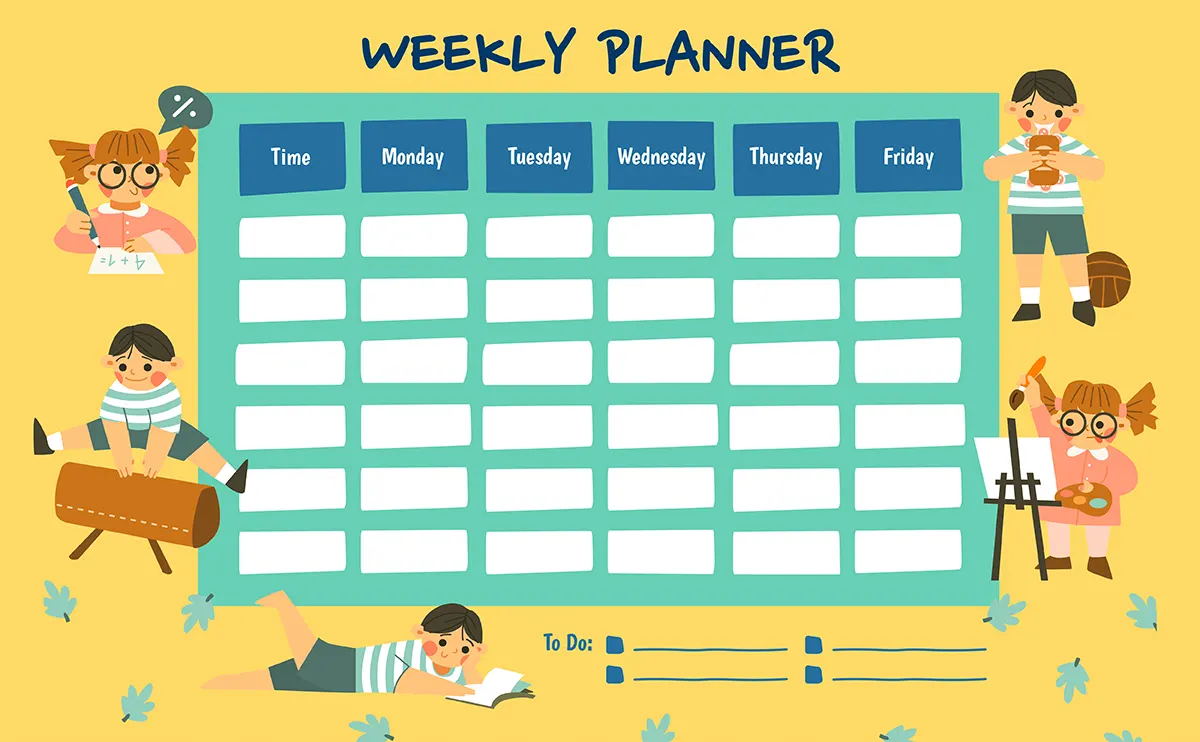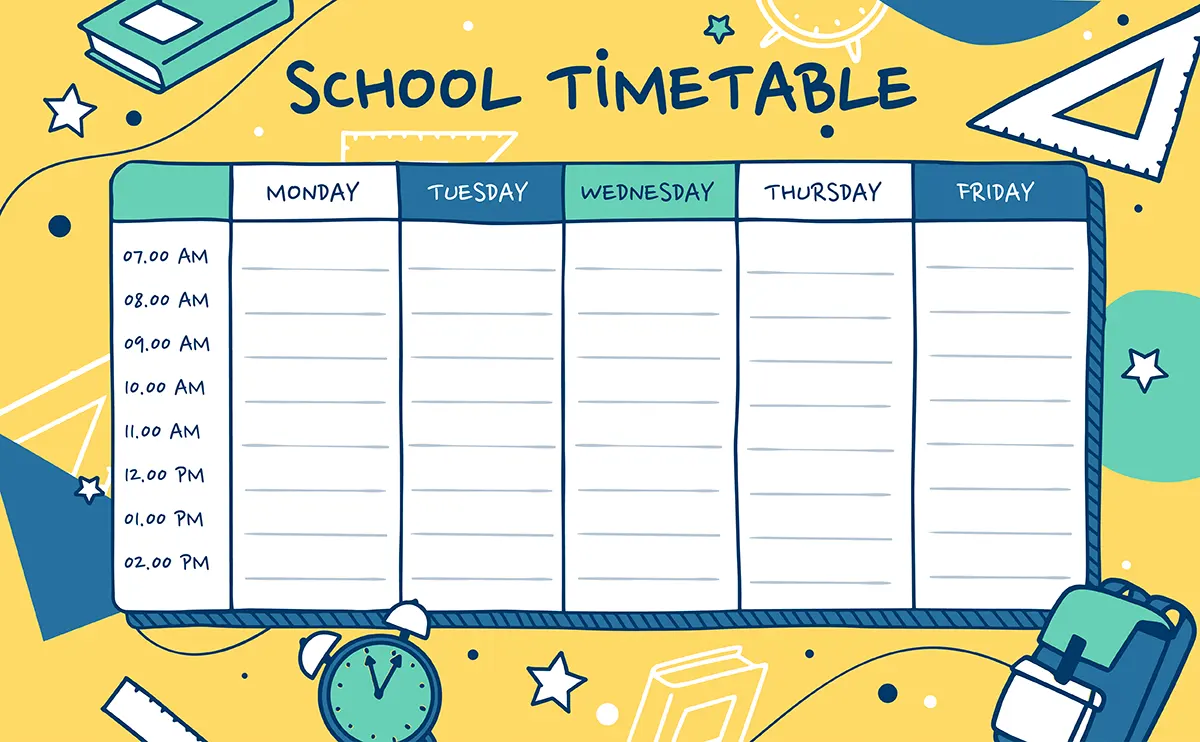Today, most parents complain that their kids are wasting too much time because they don’t have a good routine. For kids, organizing their time and figuring out what to do first can be tough.
When they’re young, kids have a curious mind which makes them want to try out a lot of things, all at once. However, if they learn how to manage their time from a young age, they can focus better on each task, get more things done, and make better decisions. This means they’ll have more time for themselves too. It’s like learning a superpower that sets them up for success in life!
In this blog, we’ve put together an A-Z guide for learning this superpower of time management for kids. Navigate through these tips and help your child have a productive and fruitful schedule!

Why Is Time Management Important for Kids?
Time management skills for kids need to be embedded in them from a young age for their better development and to lay the foundation for good habits.
- Teaching preschoolers about time management means helping them understand when to eat, sleep, play, and do other daily life tasks. Differentiation is what needs to be taught to them first.
- Kids in grades 1 and 2, who will now start to navigate through their academic journey need to learn how to prioritise and strike a balance between their schoolwork and playtime. Doing this from an early age helps to develop proper discipline.
- Time management for kids in grades 3-5 becomes crucial since they face increased academic pressure along with exploring interests beyond the academic world. Additionally, mastering time management skills sets them up for the transition to higher grades.
Since you are now familiar with the importance of time management for kids, let me break down the different concepts of time management to help you understand this topic further!
Understanding Time Management Concepts for Kids
When we talk about time management for kids, we touch upon various parts of the entire process which kids might not know about. While we understand what scheduling and prioritising is, they might need a little breakdown of these.
Let’s first talk about prioritisation. Teaching your little ones how to prioritise is one of the first parts of this process. Start doing this by helping them understand what is more important. You could teach this habit with small steps in their day-to-day life. For instance, if they have summer homework, ask them which one to do first based on difficulty and deadlines. Give them feedback and be patient as they learn.
After they learn how to prioritise, allow your kids to make schedules and plan their time. You can start by creating a morning routine or setting study and play times. Talk to them about how long tasks might take, and check in with them afterwards. This helps them learn how to manage their time better. Doing this regularly would help them understand how much time to allot for individual tasks.
Setting small goals and rewarding your child is an extremely important part of time management for kids. It helps them develop habits quickly and makes learning fun for them.
For example, if they finish solving five pages of a workbook every day before bed, they get fifteen minutes of extra playtime.
As your child practices these concepts daily, they improve their overall time management skills. Now, let me list down some time management tips for children that you can follow to help your little one manage his time. Try them all and see which ones suit your child the best!
Practical Tips for Teaching Time Management to Kids
- Create routines: Creating daily routines teaches kids discipline. Set regular bedtimes, meal times, and study times. For example, have them solve a math paper each day with a timer. This strengthens their skills and helps them see where they need to improve.
You can refer to Oswal Publisher’s collection of Key2Practice workbooks which consists of a variety of books for various subjects such as Maths, Hindi, English, and Preschoolers to classes 1 -5 with relevant age groups.
- Use visual aids: It is scientifically proven that kids understand visual information better than text. Make colourful charts and schedules with daily, weekly, or monthly tasks. Involve your child in making them so they feel part of the process. If your child is tech-savvy, you could consider mobile apps instead of charts to make it more interesting for them.
- Set achievable goals: You need to keep in mind that your little one is little. Set goals that are achievable and be easy on them at times. When we as adults fail to follow routines to the tip every day, how can we expect kids to do the same? Analyse their speed and potential and tailor the schedule accordingly.
- Manage distractions: If your child gets distracted easily, allot a specific time and rules for screens and be strict with it. Keep a regulation on these distractions or they would throw time management out of the window.
- Give breaks between longer tasks: Anything longer than one hour is too long for kids. If you feel like a particular task would take long enough, break it down and give 5/10-minute breaks for the same. This would help them refresh their mind and not tire themselves out.
- Let them know about the consequences: While rewarding is necessary, so is being strict. Don’t just create a schedule and forget about it in a week or two. Make sure that your kids know about the consequences of purposely skipping tasks, which could include delaying/reducing their screen time.
- Don’t over plan: Last but not least, don’t over plan. Let there be free time and ample space left for the child so that they don’t get frustrated.
Thus, teaching your kid about time management could be as easy as following these steps.
In the next section, let’s discuss some similar tools that would help them become a pro in it!
Time Management Tools and Concepts for Kids
Say goodbye to late homework and unattended practices! These terrific time management activities for kids like timers, schedulers, charts, apps, and digital calendars are designed to assist them.
Here are a few suggestions:
- A simple and useful picture card scheduler app for kids called a to-do list. It gives them reminders and helps them stick to routines.
- Another fun tool for timekeeping, increasing productivity and monitoring screen time is Flipd: Focus & Study Timer.
- A good personalised task manager application is Remember the Milk which helps your child to get things done faster.
- Use colourful time management charts for kids that are available online like daily planners, time organiser charts, weekly planners and even school timetables. You can either take a printout of these templates or have a fun art session making these with your child.


Be a cool parent and use these cool tools that your child will thank you for. However, along with the benefits, come challenges that need solving. Let’s explore these issues together, and I’ll provide solutions to overcome them.
Overcoming Common Time Management Challenges
The journey for learning time management might not be smooth and can have some obstacles. Kids may encounter problems when trying to manage their time, such as procrastination, lack of motivation, or difficulty with transitions between tasks.
To help them overcome these challenges, you can refer to the points mentioned below:
- Encourage tackling longer tasks first to get them done. Overthinking about how long a task will take can lead to delays.
- Offer short breaks when switching tasks to maintain focus. Avoid screen time during these breaks to prevent distraction. Instead, play games, solve riddles, or do puzzles together.
- On some days, kids may lack motivation and procrastinate. In those times, give them rest days and teach them to be resilient and persevere. Remind them that they can try again tomorrow, as each day brings new opportunities. A bad day or week doesn’t mean they’ve failed.
Setting Realistic Expectations and Celebrating Progress
Parents, you are the first teachers for your kids and so you need to be empathetic so that your child doesn’t feel pressurized. It is a graph for learning time management which will have a few slopes here and there. Thus, setting realistic expectations and being patient with the learning process is necessary for parents.
You should be your child’s best friend and celebrate small victories and progress with them, rather than focusing solely on achieving perfection. Talking about self-reflection with your child is very valuable for their growth and development.
Every Tick Counts While Doing Time Management for Kids
Time management for kids might feel like a rollercoaster but it is an important ride. Focusing on these steps when setting up their daily schedule is a great way to begin this journey. Use technology in your favour and make use of these time management games and apps.
And always remember the greatest artist, Michelangelo’s words, “There is no greater harm than that of time wasted.”
Make sure to be encouraging and patient while you’re implementing these strategies. Be consistent with your efforts and be a good role model for your child.
FAQs on Time Management for Kids
Q1. How to teach time management to kids?
Ans: The most fruitful way to teach time management to your kids is by making the process fun and exciting for them. Formulate colourful schedules and timetables. Explore apps and games designed for time management to engage your child in the learning process.
Q2. How can parents help their children with time management?
Ans: Parents need to set a good example for their kids to manage time. At home, you should encourage planning and organization in the family so that your children learn from it.
Also, offer support and assistance to your child when needed and provide them with as many resources for time management as you can.
Q3. What are some signs that indicate a child may be struggling with time management?
Ans: Watch out for your child when they start struggling with deadlines, stay confused about when to do what and are very frequently underprepared for their tests. These could be signs that they are struggling with time management and require assistance for the same.
Q4. What are the consequences of poor time management for kids?
Ans: The consequences of not learning how to manage time can start from a young age and turn out to be severe after a while. Poor time management for kids can lead to stress and anxiety, poor academic performance, and missed opportunities for personal growth.

